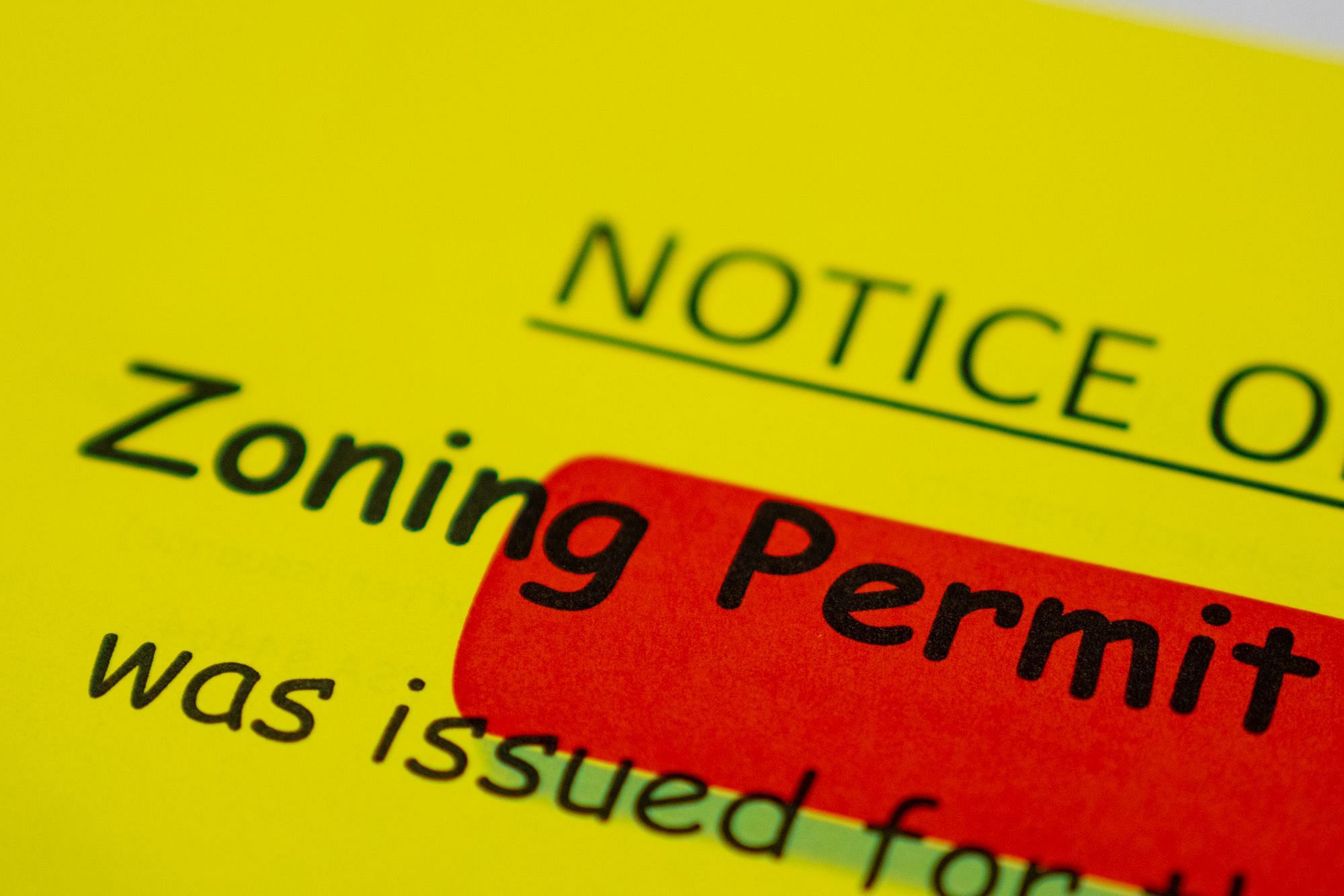Home>diy>Planning & Engineering>How To Get A Zoning Permit


Planning & Engineering
How To Get A Zoning Permit
Modified: January 9, 2024
Learn how to obtain a zoning permit for your project with our comprehensive planning and engineering services.
(Many of the links in this article redirect to a specific reviewed product. Your purchase of these products through affiliate links helps to generate commission for Storables.com, at no extra cost. Learn more)
Introduction
Welcome to our comprehensive guide on how to obtain a zoning permit. Whether you are a homeowner looking to build an addition to your property, or a business owner planning to start a new venture, understanding the zoning regulations and obtaining the necessary permits is essential. Zoning regulations help to ensure that land use is organized and maintained in a way that benefits the community as a whole.
However, navigating the zoning permit process can be daunting, especially if you are unfamiliar with the intricacies of local regulations. That’s why we have created this guide to provide you with a step-by-step approach to obtaining a zoning permit. By following this guide, you’ll be equipped with the knowledge and strategies to successfully navigate the permit process and bring your project to fruition.
Before we delve into the specifics of obtaining a zoning permit, it’s important to have a basic understanding of zoning regulations and their purpose. Zoning regulations divide land into different zones or districts, each with its own set of permitted land uses, building codes, and development standards.
These regulations are put in place to create a harmonious and functional community by ensuring that land uses are compatible and that buildings adhere to safety and aesthetic standards. Zoning regulations can govern various aspects, such as the type and size of buildings allowed, the number of parking spaces required, and even the distance between buildings and property lines.
By obtaining a zoning permit, you are seeking official approval to use your property in a way that may not be allowed by the existing zoning designation or to make modifications to a property within the required parameters. This permit confirms that your proposed use or modification aligns with the regulations in place.
It’s important to note that zoning regulations vary from one jurisdiction to another, so the specific processes and requirements may differ depending on where your property is located. It’s crucial to familiarize yourself with the local zoning ordinances and consult with the appropriate zoning or planning department to ensure compliance.
In the following sections, we will walk you through the steps involved in obtaining a zoning permit, from researching zoning requirements to submitting your application and navigating the review process. We will also touch on possible appeals and modifications that may arise along the way. Let’s get started!
Key Takeaways:
- Understanding zoning regulations, researching requirements, and preparing a thorough application are crucial steps in successfully obtaining a zoning permit for your construction or development project.
- Patience, cooperation, and open communication with the zoning department are essential for navigating the review process and addressing potential appeals or modifications to ensure compliance with zoning regulations.
Read more: How To Get A City Permit For Construction
Understanding Zoning Regulations
In order to successfully obtain a zoning permit, it’s vital to have a solid understanding of the zoning regulations that apply to your property. Zoning regulations are typically established by local governments to regulate land use and promote orderly and sustainable development within their jurisdictions.
These regulations outline the various zoning districts and specify the permitted uses, building requirements, and other development standards for each district. They are designed to ensure compatibility between different land uses and protect the safety, character, and quality of neighborhoods and communities.
When it comes to understanding zoning regulations, there are three key elements to consider:
- Zoning Districts: Zoning regulations divide areas into different districts, such as residential, commercial, industrial, and mixed-use. Each district has specific rules regarding the types of activities and developments allowed.
- Land Use Classifications: Within each zoning district, there are specific classifications that further define the acceptable land uses. For example, within a residential zone, there may be different classifications for single-family homes, duplexes, and apartment buildings.
- Development Standards: Zoning regulations also establish development standards that govern the physical aspects of buildings and properties, including setbacks, building height, lot coverage, parking requirements, signage, and landscaping.
Before embarking on any construction or development project, it’s crucial to determine the zoning district and land use classification of your property. This information can typically be found in the local zoning code or by contacting the zoning or planning department of your municipality.
Once you have identified the zoning district and land use classification, review the regulations associated with that district to understand what is permitted and what restrictions may apply. Some common considerations include:
- Types of Permitted Uses: Determine the types of businesses or activities that are allowed in your zoning district. For example, certain residential zones may not permit home-based businesses or commercial operations.
- Building Regulations: Familiarize yourself with the building codes and requirements for the district, including setbacks, height limits, and other design guidelines.
- Environmental Impact: Consider any specific regulations related to environmental protection, such as wetlands conservation, floodplain management, or noise restrictions.
- Infrastructure Requirements: Understand the infrastructure needs for your project, such as access to water, sewer, and utilities, and ensure your plans align with the existing infrastructure capacity.
By thoroughly understanding the zoning regulations that pertain to your property, you can ensure that your project aligns with the requirements and avoid complications or delays in the permitting process.
Researching Zoning Requirements
Once you have a basic understanding of zoning regulations, the next step in obtaining a zoning permit is to research the specific requirements that apply to your property. This research will help you determine what steps you need to take and what documentation you need to gather in order to submit a successful permit application.
Here are some key steps to follow when researching zoning requirements:
1. Consult the Zoning Code:
Start by reviewing the local zoning code or ordinance. This document outlines the specific regulations and requirements for each zoning district. It typically includes information on land use classifications, setbacks, lot coverage, building height limits, parking requirements, and any additional guidelines or standards.
2. Visit the Zoning or Planning Department:
Make a visit to the zoning or planning department of your local municipality. They will have detailed information regarding your property’s zoning designation and any additional requirements specific to your location.
Read more: How To Get A Building Permit For A House
3. Research Special Use Permits or Variances:
If your proposed project does not fully comply with the zoning regulations, you may need to apply for a special use permit or variance. Research the specific requirements and procedures for obtaining these permits, as they often involve additional documentation, public hearings, and approval from the zoning board or planning commission.
4. Consider Surrounding Properties:
Take note of the land uses and structures surrounding your property. Understanding nearby properties and their allowable uses can give you a sense of what is acceptable and can help inform your project plans.
5. Hire a Zoning Consultant:
If you find the zoning requirements complex or difficult to understand, consider hiring a zoning consultant or land use attorney. They can provide expert guidance, ensure compliance with regulations, and assist with the application process.
By thoroughly researching zoning requirements, you can gather the necessary information and resources to move forward with confidence and ensure that your project aligns with the local zoning regulations. This step is crucial for a successful permitting process and can help you avoid potential setbacks or issues along the way.
Preparing the Zoning Permit Application
Once you have thoroughly researched the zoning requirements for your property, it’s time to prepare the zoning permit application. The application serves as a formal request to the local zoning or planning department for approval of your proposed project.
Here are some important steps to follow when preparing your zoning permit application:
Read more: How To Get Construction Permit
1. Gather Required Documents:
Review the zoning code and any additional regulations or guidelines to determine the specific documents and information needed for your application. Common documents may include:
- Property surveys or site plans, showing the location of existing buildings, proposed improvements, setbacks, and other relevant details.
- Architectural drawings or plans, illustrating the design and layout of the proposed project.
- Photographs or visual representations of the site and surrounding area.
- A description or narrative of the proposed project, including its purpose, dimensions, materials, and any impact on the surrounding environment or community.
- Proof of ownership or authorization to perform work on the property.
- Any additional supporting documentation as required by the zoning department.
2. Fill out the Application Form:
Contact the zoning or planning department to obtain the official zoning permit application form. Ensure that you complete the form accurately and provide all required information. Be clear and concise in your responses and provide any additional information that may be relevant to your project.
3. Seek Professional Assistance:
If you are unsure about filling out the application or need assistance with the technical aspects, consider hiring a professional, such as an architect or engineer, to help prepare the necessary documents and drawings. Their expertise can ensure that your application is complete, accurate, and in compliance with the regulations.
4. Pay Application Fees:
Be aware that there may be fees associated with the zoning permit application. Research the specific fees and payment methods accepted by the zoning or planning department. Make sure to include the required payment with your application.
Read more: How To Get A Permit For Home Improvement
5. Double-Check Your Application:
Before submitting your zoning permit application, carefully review all the documents, forms, and supporting information to ensure accuracy and completeness. Keep copies of all materials for your records.
By properly preparing your zoning permit application and providing all the necessary documentation, you increase the chances of a smooth and efficient review process. Taking the time to gather and organize the required information demonstrates your commitment to following the zoning regulations and improves your chances of obtaining the necessary permit for your project.
Submitting the Zoning Permit Application
After carefully preparing your zoning permit application, the next step is to submit it to the appropriate zoning or planning department. The submission process will vary depending on the jurisdiction and local requirements, but there are some general steps to follow when submitting your application:
1. Check Application Submission Requirements:
Review the guidelines provided by the zoning or planning department to ensure that you have met all the submission requirements. This may include making copies of your application and supporting documents, organizing them in a specific order, and providing any additional information or forms requested.
2. Contact the Zoning Department:
Call or visit the zoning or planning department to confirm their hours of operation and any specific instructions for submitting your application. Some departments may require appointments or have designated submission hours.
Read more: How To Get A Permit For House Renovation
3. Submit the Application:
Bring your completed zoning permit application and all supporting documents to the zoning or planning department. Present your application to the staff at the front desk and follow any additional instructions they may provide. Make sure to keep copies of all submitted materials for your records.
4. Pay Required Fees:
Upon submission, you will likely be required to pay the applicable fees for your zoning permit application. This may be done at the time of submission or as part of a subsequent invoice. Ensure you have the necessary funds and payment method ready.
5. Obtain a Receipt:
If possible, request a receipt or confirmation of submission from the zoning or planning department. This will serve as proof that you have submitted your application and paid the required fees. Keep this receipt in your records for future reference.
6. Follow Up:
After submitting your zoning permit application, it’s a good idea to periodically follow up with the zoning or planning department to check on the status of your application. This will help ensure that it is being reviewed and processed in a timely manner. If there are any missing documents or additional information required, you will be notified, allowing you to address any issues promptly.
Submitting your zoning permit application is a crucial step in the overall process. By carefully following the submission requirements and maintaining open communication with the zoning or planning department, you can increase the chances of a successful review and approval of your permit application.
Review and Approval Process
After you have submitted your zoning permit application, it undergoes a review process by the local zoning or planning department. This review is conducted to ensure that your proposed project meets all the relevant zoning regulations and other applicable laws. The review and approval process can vary depending on the complexity of your project and the specific regulations in your jurisdiction. Here are the general steps involved in the review and approval process:
1. Initial Review:
Upon submission, the zoning or planning department will conduct an initial review of your application to ensure that all necessary documents and information are included. They will verify that your project complies with the relevant zoning requirements and any other applicable laws, such as building codes or environmental regulations.
2. Site Inspection:
As part of the review process, the zoning or planning department may conduct a site inspection to assess the project’s impact on the surrounding area. This inspection helps to ensure that the proposed project aligns with the existing neighborhood character and meets the zoning regulations, such as setbacks and building height requirements.
3. Additional Information Requests:
If the reviewing authority identifies any deficiencies or requires additional information, they will contact you to request the necessary materials. This can include clarifications, revisions to plans, or additional documents related to the project or its impact on the environment or community.
Read more: How To Get Firearm Permit For Home Defense
4. Technical Review and Compliance Check:
The zoning or planning department will review your application in detail, making sure that the project complies with all relevant regulations. This includes assessing the proposed land use, building design, setbacks, parking requirements, and other zoning standards. They may consult with various departments, such as building and safety, environmental, or transportation, to ensure compliance across different areas.
5. Public Notification and Input:
Depending on the nature of your project and local regulations, there may be a requirement for public notification and input. This can include posting signs on the property, sending notices to neighboring residents, or conducting a public hearing to gather feedback and allow for public comments on the project.
6. Review Decision:
Once the review process is complete, the zoning or planning department will make a decision on your zoning permit application. This decision can either grant approval, approve with conditions, or deny the permit. If approved, you will typically receive a written notice specifying any conditions or requirements you must adhere to.
It’s important to note that the review and approval process can take varying amounts of time depending on the complexity of the project, the workload of the zoning department, and any public input or hearings required. It’s advisable to be patient and maintain open communication with the zoning or planning department throughout the process.
By cooperating with the review and approval process, addressing any concerns or requests for additional information, and ensuring your project complies with the zoning regulations, you increase the likelihood of a successful outcome and the issuance of your zoning permit.
Possible Appeals and Modifications
While we hope that your zoning permit application will be approved without any issues, there may be instances where you need to consider appeals or modifications to your project. These situations arise when there are disagreements, objections, or changes required to comply with zoning regulations. Here are some key factors to keep in mind:
1. Appealing a Decision:
If your zoning permit application is denied or approved with conditions that you believe are unfair or unwarranted, you have the option to appeal the decision. The appeals process typically involves submitting a formal appeal to the appropriate appeal board or zoning board of adjustment. This board reevaluates the decision, taking into account any additional information or arguments presented, and makes a final determination.
2. Seeking a Variance:
If your proposed project does not comply with specific zoning regulations, you may consider applying for a variance. A variance provides relief from certain regulations when strict adherence would cause undue hardship. Variance applications require demonstrating that you meet specific criteria outlined in the zoning code. The final decision is typically made by the zoning board of adjustment or similar body.
3. Requesting Modifications:
In some cases, you may need to request modifications to your project plans or specifications after your zoning permit has been approved. This could be due to unforeseen challenges or changes in circumstances. Depending on the nature and scope of the modifications, you may need to submit a supplemental application or request to the zoning or planning department for their review and approval.
4. Engaging in Mediation or Negotiation:
If there are disagreements or conflicts with other property owners or stakeholders during the zoning process, mediation or negotiation may be a valuable resource. Mediation involves a neutral third party assisting in resolving disputes and finding common ground. Through effective communication and collaboration, mediation can help address concerns and potentially avoid the need for formal appeals or modifications.
5. Consulting with Professionals:
If you encounter challenges or need assistance with appeals or modifications, it can be beneficial to consult with professionals such as land use attorneys, zoning consultants, or architects. These experts can provide guidance, advice, and advocacy throughout the process, increasing the chances of a successful resolution.
It’s important to note that the appeals and modification processes may vary depending on your jurisdiction’s specific regulations. It’s essential to thoroughly research and understand the specific procedures and requirements outlined by the local zoning or planning department.
By being aware of the potential for appeals or modifications and being prepared to handle them if necessary, you can navigate any obstacles that arise and work towards a resolution that allows your project to move forward while complying with zoning regulations.
Conclusion
Obtaining a zoning permit is a crucial step in ensuring compliance with local regulations and moving forward with your construction or development project. By understanding the zoning regulations, conducting thorough research, and preparing a comprehensive application, you increase the likelihood of a successful outcome. However, it’s important to remember that the process can be complex, and there may be challenges along the way.
Throughout this guide, we have provided you with a step-by-step approach to navigating the zoning permit process. From understanding zoning regulations to researching requirements, preparing the application, and submitting it, each step plays a critical role in obtaining the necessary approval for your project.
The review and approval process can take time, and you may encounter situations where appeals or modifications are necessary. By being prepared to address any concerns or objections and seeking professional guidance when needed, you can navigate these challenges and work towards a resolution that aligns with the zoning regulations and allows your project to move forward.
Remember to maintain open communication with the zoning or planning department throughout the process. Regularly follow up on the progress of your application and be proactive in addressing any requests for additional information or revisions. Patience, cooperation, and a thorough understanding of the zoning regulations will greatly contribute to your success in obtaining a zoning permit.
Lastly, always consult with local zoning and legal professionals and refer to specific regulations in your jurisdiction. Zoning regulations and processes can vary, and it’s crucial to ensure that you are aware of and comply with the applicable standards and requirements in your area.
We hope that this guide has provided you with valuable insights and a clear roadmap to obtaining a zoning permit. By following the steps outlined in this guide and being proactive in addressing any challenges that arise, you will be well-equipped to navigate the complexities of the zoning process and bring your project to fruition. Good luck!
Frequently Asked Questions about How To Get A Zoning Permit
Was this page helpful?
At Storables.com, we guarantee accurate and reliable information. Our content, validated by Expert Board Contributors, is crafted following stringent Editorial Policies. We're committed to providing you with well-researched, expert-backed insights for all your informational needs.








0 thoughts on “How To Get A Zoning Permit”